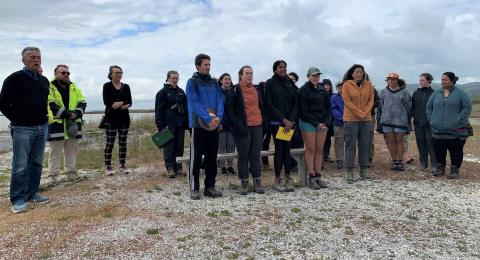The Animal Science minor at UNH is a good fit if you are passionate about working with animals and interested in the science of animal care and management. This minor will provide you with a solid foundation in the biology, care and management of domestic animals and is especially valuable for those pursuing careers in in veterinary fields, livestock management, animal husbandry, and related industries, as it provides practical knowledge in areas like animal nutrition, reproduction and health.
What is Animal Science?
The study of animal science will provide you with an introduction to the biology and management of animal species. In this minor, you’ll choose from a wide array of electives, with the potential to delve into topics such as animal genetics, diseases, and ethics, and gain hands-on equine, poultry and dairy experience. Your studies will prepare you for careers in various animal industries or further studies in veterinary medicine or graduate school.
Why Study Animal Science at UNH?
At UNH we offer a range of hands-on, real-world experience through campus facilities that include the Fairchild Dairy Teaching and Research Center, the Lou & Lutza Smith Equine Center, the Organic Dairy Research Farm, the Aquaculture Research Center, the Ritzman Aquaculture Facility and the high tunnels for poultry and small ruminants.
Potential Career Areas
- Animal business ownership
- Education and extension
- Government (USDA)
- Advocacy
- Animal management
- Research
- Veterinary medicine
Curriculum & Requirements
The study of animal science will provide you with an introduction to the biology and management of animal species. In this minor, you’ll choose from a wide array of electives, with the potential to delve into topics such as animal genetics, diseases, and ethics, and gain hands-on equine, poultry and dairy experience. Your studies will prepare you for careers in various animal industries or further studies in veterinary medicine or graduate school.
- Academic policies related to Minors.
- A minor in Animal Science consists of a minimum of 20 credits of Animal Science (ANSC) courses.
- No more than 7 credits may be taken in the Thompson School of Applied Science (AAS) and at the 400- level.
- Students must receive a minimum grade of C- in any course used for the minor. Students failing to do this will need to retake the course in order to receive credit.
- No courses taken on a pass (credit)/fail basis may count toward the minor.
- Students who transfer from other institutions may petition the animal science program faculty for course approval.
- No more than eight credits used to satisfy major requirements may be used for the minor.
| Code | Title | Credits |
|---|---|---|
| Required Courses | ||
| Introductory Courses | ||
| Select one course from the following: | 4 | |
AAS 425 | Introduction to Dairy Herd Management | |
ANSC 401 | Animals and Society | |
ANSC 421 | Introduction to Animal Science | |
ANSC 427 | Introduction to Equine Science | |
| Experiential Courses | ||
| Select a minimum of one course from the following: | 2-12 | |
ANSC 515 | Explorations in Veterinary Medicine | |
ANSC 526 | Equine Conformation, Movement, and Performance | |
ANSC 647 | Equine Stable Management | |
ANSC 603 | Introduction to Livestock Management | |
ANSC 605 | Poultry Production and Health Management | |
ANSC 698 | Cooperative for Real Education in Agricultural Management (CREAM) 1 | |
ANSC 728 | Advanced Dairy Management II 1 | |
ANSC 795 | Investigations | |
| Additional Courses | ||
| Select a minimum of one course from the following: | 2-12 | |
ANSC 511 | Animal Anatomy and Physiology I | |
ANSC 512 | Animal Anatomy and Physiology II | |
ANSC 543 | Technical Writing in Animal Sciences | |
ANSC 602 | Animal Rights and Societal Issues | |
ANSC 609 | Principles of Animal Nutrition | |
ANSC 612 | Genetics of Animals | |
ANSC 625 | Animal Diseases | |
ANSC 627 | Animal Health Applications | |
ANSC 670 | Exotic Companion Species Health and Management | |
ANSC 690 | Livestock and Wildlife in Namibia: Challenges, Opportunities and Geography | |
ANSC 701 | Physiology of Reproduction | |
ANSC 710 | Dairy Nutrition | |
ANSC 715 | Physiology of Lactation | |
ANSC 724 | Reproductive Management and Artificial Insemination | |
ANSC 750 | Collaborative Farm Design and Development | |
- 1
Note that previous dairy course work is highly recommended for success in these upper level courses
Explore Program Details
CREAM is a student-run cooperative in which 25 UNH students operate and manage a small business consisting of a registered Holstein dairy herd. CREAM is a yearlong course that gives students the opportunity to gain hands on experience in working with the dairy cows. Each fall, the herd is passed on to a new group of students with the help of a transition team of student advisors, as well as dairy center personnel, and faculty advisors. CREAM has been operating at UNH since 1997 and has progressed as a program each year due to the dedication and commitment of the students, faculty, and dairy center staff.
















